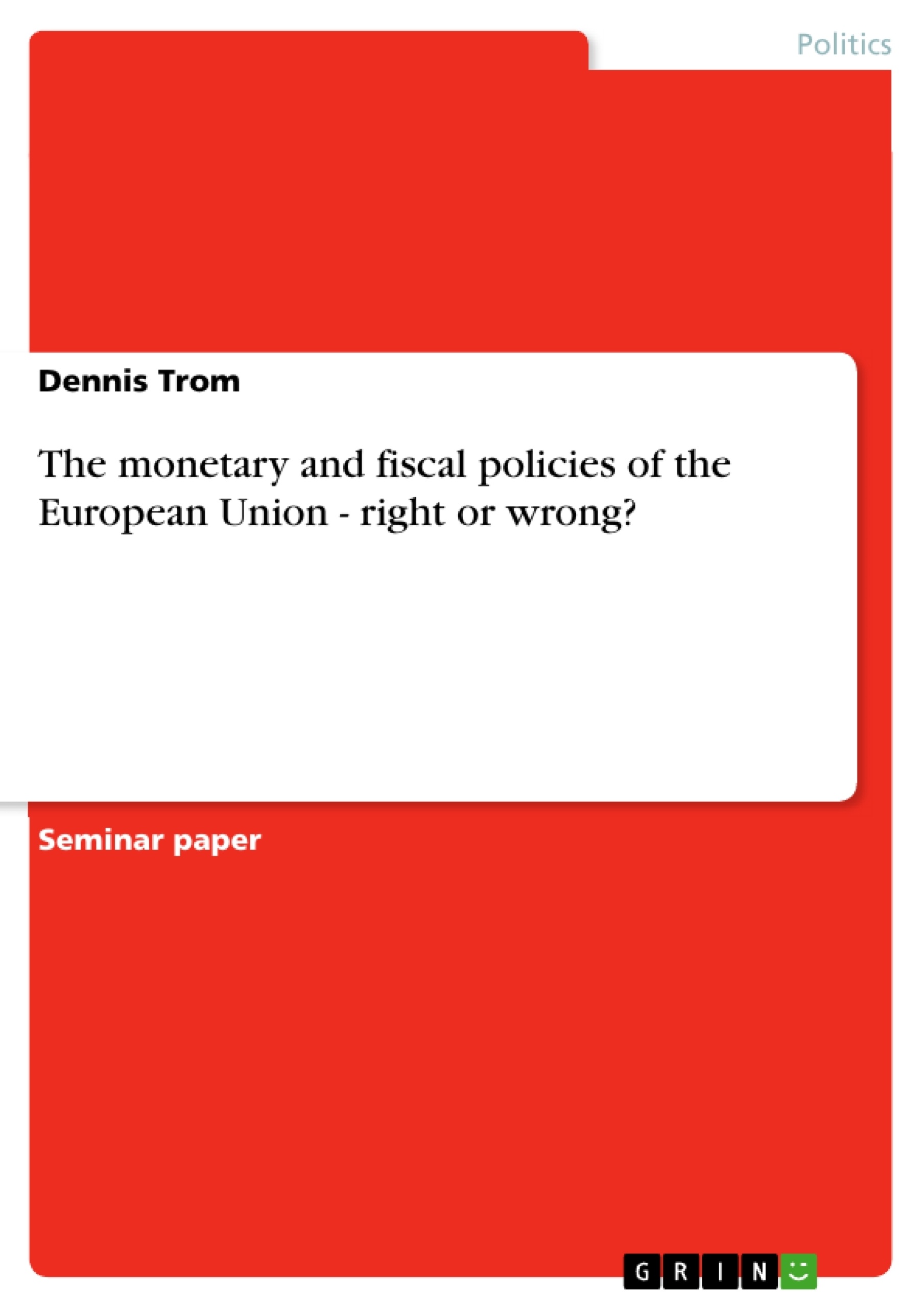In the following home-exam I will write about the monetary and fiscal policies in Europe with
the research question, does the EU do it right or wrong? I have chosen this topic because it is
a current important but also very complex debate with different points of view.
It starts with a the first point of my exam, the fiscal governance. It includes the fiscal policy rules, independet fiscal institutions, frameworks and the theory of optimum currency areas.
The next point which is produced by the optimum currency areas, is the risk and bailout in the European Monetary Union. After this fiscal part I will focus on the topic of monetary policy.
It includes the European Central Bank with it councils. The following part are the goals of the ECB and monetary policy. An interesting question like “does only price stability matter?” will be answered. Afterwards I am going to write about the complexe instruments of the ECB.
Near to the end I will give some important arguments for the question “how advanced is the
EU right now?”
The last part is the conclusion. It will include all important facts of this work and answer the
research question.
Inhaltsverzeichnis (Table of Contents)
- Introduction
- Fiscal Governance
- Fiscal Policy Rules
- Independet fiscal institutions
- Medium-term budgetary frameworks
- The theory of optimum currency areas
- Risks and bailout in the European Monetary Union
- The European Central Bank
- Goals of the ECB and monetary policy
- Instruments of the ECB
- How advanced ist the European Union
- Conclusion
- Sources
Zielsetzung und Themenschwerpunkte (Objectives and Key Themes)
This home-exam aims to explore the effectiveness of monetary and fiscal policies in Europe. It analyzes the strengths and weaknesses of these policies, examining whether the EU is implementing them effectively. The examination delves into various aspects of fiscal governance, including fiscal policy rules, independent fiscal institutions, medium-term budgetary frameworks, and the theory of optimum currency areas. It also explores the role of the European Central Bank (ECB), its goals, and instruments. The study further examines the current state of the EU's progress and concludes with a discussion on the effectiveness of these policies.
- Fiscal governance and its effectiveness in the EU
- The role of independent fiscal institutions
- The impact of fiscal policy rules and budgetary frameworks
- The European Central Bank's monetary policy and its objectives
- The progress and current state of the European Union
Zusammenfassung der Kapitel (Chapter Summaries)
The introductory chapter establishes the research question: Does the EU effectively manage its monetary and fiscal policies? It outlines the scope of the analysis, covering fiscal governance, the European Central Bank, and the EU's overall progress. The chapter provides a roadmap for the subsequent exploration of these themes.
Chapter 2 dives into the concept of fiscal governance, defining it as a set of rules, procedures, and regulations that influence budgetary policy planning, approval, and monitoring. It emphasizes the importance of fiscal governance in reducing cyclicality, improving spending efficiency, and attaining a sustainable budgetary position.
Chapter 2.1 focuses on fiscal policy rules, which are numerical targets or pressures designed to guide budgetary decision-making. It explores the use of indicators such as debt, budget balance, and revenue development to measure fiscal outcomes. The importance of political commitment, enforcement, and monitoring for effective rule implementation is highlighted.
Chapter 2.2 examines the role of independent fiscal institutions, which are non-public bodies that aim to improve fiscal policy through analysis, assessments, and recommendations. These institutions often provide macroeconomic forecasts for budget planning, often offering a more realistic perspective than official government forecasts.
Frequently Asked Questions
What is fiscal governance in the European Union?
It refers to the rules, procedures, and institutions that shape how budgetary policies are planned, approved, and monitored to ensure sustainable finances.
What is the "Optimum Currency Area" (OCA) theory?
OCA theory suggests that for a single currency to be successful, member regions must have integrated economies, labor mobility, and similar business cycles.
What are the main goals of the European Central Bank (ECB)?
The primary goal is price stability. The ECB also supports general economic policies in the EU as long as they don't conflict with price stability.
Does only price stability matter for the ECB?
While price stability is the priority, the ECB also considers other factors like growth and employment, though its mandate is more focused than the US Federal Reserve's.
What are the risks of bailouts in the Monetary Union?
Bailouts can create "moral hazard," where countries might take more fiscal risks assuming other member states will rescue them in a crisis.
- Quote paper
- Dennis Trom (Author), 2013, The monetary and fiscal policies of the European Union - right or wrong?, Munich, GRIN Verlag, https://www.grin.com/document/267330



